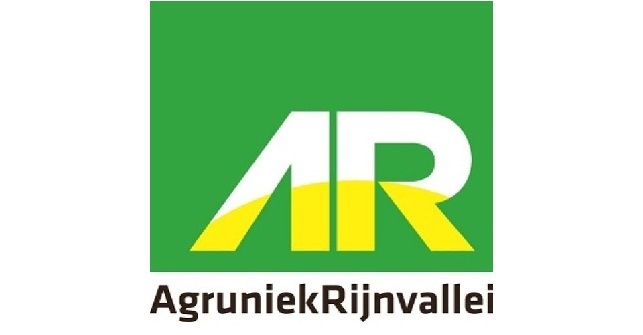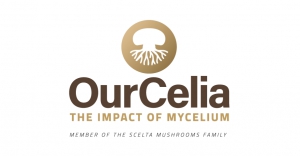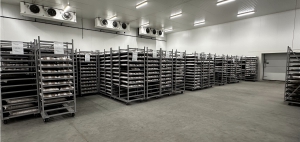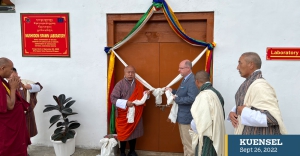Ecovative, a pioneer in mycelium-based technologies for sustainable food and materials, today announced the sale of its Netherlands-based subsidiary, Ecovative Spawn & Substrate BV, to the Klerken family, founders of Scelta Mushrooms.
Under the Klerken family’s ownership, the business will be renamed OurCelia, marking a new chapter in its support of the mushroom industry and introducing new solutions to mushroom farmers globally. This transition reflects a marriage of strengths: Ecovative’s leadership in mycelium innovation, stretching two decades, and the Klerken family’s deep roots in the global mushroom industry, dating back to 1963. Together, the two organizations will maintain a close, long-term relationship to advance the supply of world-class spawn products to both mushroom and mycelium producers. Ecovative previously acquired Lambert Spawn Netherlands in 2022 from its U.S. parent company, Lambert Spawn, founded in 1919 and recognized as the world’s oldest spawn producer. With this foundation, the Dutch spawn activities are now continuing under the Klerken family as OurCelia.
“Ecovative is proud to have grown the global supply chain for Agaricus and AirMycelium spawn from the Netherlands, and we are confident that under the Klerken family’s stewardship, OurCelia will thrive as a dedicated supplier to mushroom growers and mycelium producers worldwide,” said Eben Bayer Co-founder and CEO, Ecovative. “This step allows Ecovative to sharpen its focus on scaling AirMycelium production across our food and materials businesses in the United States, while ensuring the Dutch spawn business continues to serve the industry with excellence.” “The mushroom industry has been at the heart of our family for generations,” said Jan Klerken Sr., founder of Scelta Mushrooms. “With OurCelia, we are building on that heritage by expanding our business to include spawn and substrate production. This is a natural continuation of our commitment to advancing mushroom cultivation and supporting growers for decades to come.” In addition, Ies Hooglugt will continue in his role as managing director, ensuring continuity and trusted leadership for employees, customers, and partners of the company
Looking Ahead with OurCelia
For the Klerken family, OurCelia is more than a new company — it is a bold step to shape the future of the mushroom industry. With deep roots that stretch back generations, the family has always believed in the power of mushrooms to nourish people and transform industries. OurCelia will build on that legacy by reimagining spawn and substrate production for a new era, delivering cutting-edge solutions that help mushroom farmers grow stronger businesses, diversify their crops, and expand into new markets. By combining tradition with forward-looking innovation, the Klerken family aims to make OurCelia a global leader in advancing fungi as a cornerstone of sustainable food, agriculture, and materials for decades to come.
About OurCelia
OurCelia is a Dutch producer of high-quality mushroom spawn and substrates, rooted in decades of expertise within the global mushroom industry. Founded in 2025 following the acquisition of Ecovative Spawn & Substrate BV by the Klerken family, also founders of Scelta Mushrooms, the company builds on a long heritage of innovation and entrepreneurship in mushroom cultivation. By combining tradition with cutting-edge technologies, OurCelia supports growers worldwide with reliable, sustainable solutions that strengthen their businesses and open new opportunities for the future.
A few years ago, we visited the spawn facility in Venlo - back then still operating under the name Lambert Spawn. Much has changed since. Time for a renewed introduction. We spoke with Ies Hooglugt, site manager of the Venlo location, about technology, collaboration and Ecovative’s ambitions.
The moment you walk into Ecovative’s production site in Venlo, it’s clear: serious work is being done here to produce top-quality spawn. Since the American company Ecovative took over around 2.5 years ago, a lot has changed and improved.
“We’ve truly matured as an organization,” says Ies Hooglugt. “The technology, the processes, and the people have all grown significantly.”
Spawn as core business
The Venlo factory is a well-known name in the spawn industry, formerly operating under the Lambert Spawn brand. Today, about 90% of production is focused on mushroom spawn and 10% on so-called “non-mushroom” applications, such as leather alternatives and mycelium-based packaging.
“That market is still in development. Promising, but young,” says Hooglugt. “Our core business remains the production of mushroom spawn.”
Within that 90%, the split is approximately 80% Agaricus and 20% exotics. “A valuable addition. We see great potential there, and the results are promising.”
From grain to custom solutions
One of Ecovative Venlo’s distinguishing features lies in the substrate used for growing spawn. While many suppliers use standard grain and straw, Venlo decided to look further.
“We used to work exclusively with millet, but that’s not suitable for every mushroom species,” explains Hooglugt. In collaboration with Belgian partner Mycelia - known for its extensive knowledge of exotics - new carriers were developed: Blend and Speed Spawn.
“We tailor the substrate to the mushroom, not the other way around. This results in faster and more efficient colonization of the substrate.”
Strategic partnership with Mycelia
The collaboration with Mycelia is strategic and goes far beyond just substrate or inoculum.
“For exotics, we work together at the highest level,” Hooglugt explains. “Mycelia brings decades of experience and deep knowledge of exotic species, and we contribute our production expertise. It’s a close collaboration - from strain selection to final spawn production.
For Agaricus, we now produce our own inoculum in-house, but for exotics we consciously build on Mycelia’s strength.”
According to Hooglugt, the triangle is solid: the American parent company provides scientific power, Mycelia brings practical expertise, and Venlo contributes production knowledge.
“All of these elements complement each other perfectly.”
Quality first
The acquisition by Ecovative has raised the bar. Internal processes have been tightened, and quality systems optimized.
“The advanced and unique system we use to make spawn is fairly complex. It requires well-trained people,” says Hooglugt. “Fortunately, we have a strong and stable team here, with hardly any turnover. That’s quite exceptional in this sector.”
He likes to compare it to Formula 1: “You can have the best car, but without a skilled driver, you won’t win the race. And vice versa. Here, everything lines up — people, technology and processes.”
Testing and research
Ecovative leaves nothing to chance, as shown by its close cooperation with research institutes. Spawn is tested at Inagro in Belgium, and the company works with Wageningen University & Research (WUR).
“WUR recently developed 16 sporeless oyster mushroom strains,” says Hooglugt. “These are freely available to the market, with the exception of the Purati, which is an exclusive release by Mycelia. And we’re producing the spawn.”
Growth ambitions
Although exports are going well, there’s still room to grow in the Dutch market.
“We’d like to expand domestically,” says Hooglugt. At the same time, he sees the market evolving. “There’s consolidation happening, growers are scaling up, and so are suppliers. That’s exactly why having alternatives is becoming more important.
We notice growers are making more conscious decisions.”
A great example is an Italian Pholiota grower who felt too dependent on his regular supplier.
“He actively sought a solid alternative, and we succeeded together,” Hooglugt shares. “We developed a new solution collaboratively. That’s what we stand for: flexibility, customisation and quality. It gives growers more control over their own process.”
After our visit to Venlo, one thing is clear. Ecovative stands strong, both literally and figuratively. The team knows what it stands for, operations are tightly managed, and the vision is clear. Most of all, the door is open for growers who want to move forward.
Team Mushroom Matter
New labs for quality mushrooms, orchids
A mushroom spawn lab, and orchid micro-propagation lab were inaugurated at Serbithang, Thimphu on September 24. Agriculture Minister Yeshey Penjor and Minister Counsellor, Head of Cooperation, European Union Daniel Hachez inaugurated the facilities.
The new lab will develop pure cultures, develop mother culture, produce and supply mother spawn-to-spawn production unit at the National Mushroom Centre (NMC), regional units, and private spawn producers, produce and supply cultivation spawn with a focus on sawdust spawn for shiitake mushroom cultivation and conduct research and trials; and variety release, among others.
NMC Program Director Dawa Penjor said that the facility will go a long way in improving services to mushroom growers and encouraging new mushroom growers to make Bhutan self-sufficient in mushroom production.
“With the organic brand, we are hopeful to find niche markets in countries like India and Thailand,” he said.
Dawa Penjor said that NMC has a variety of seeds but most farmers are more familiar with two kinds, which are normally planted on wood or in soil. “Farmers are more accustomed to planting these seeds as they know more about its production process and it is mostly what people buy,” he said.
Please read the full article here.
Source: Kuensel
























